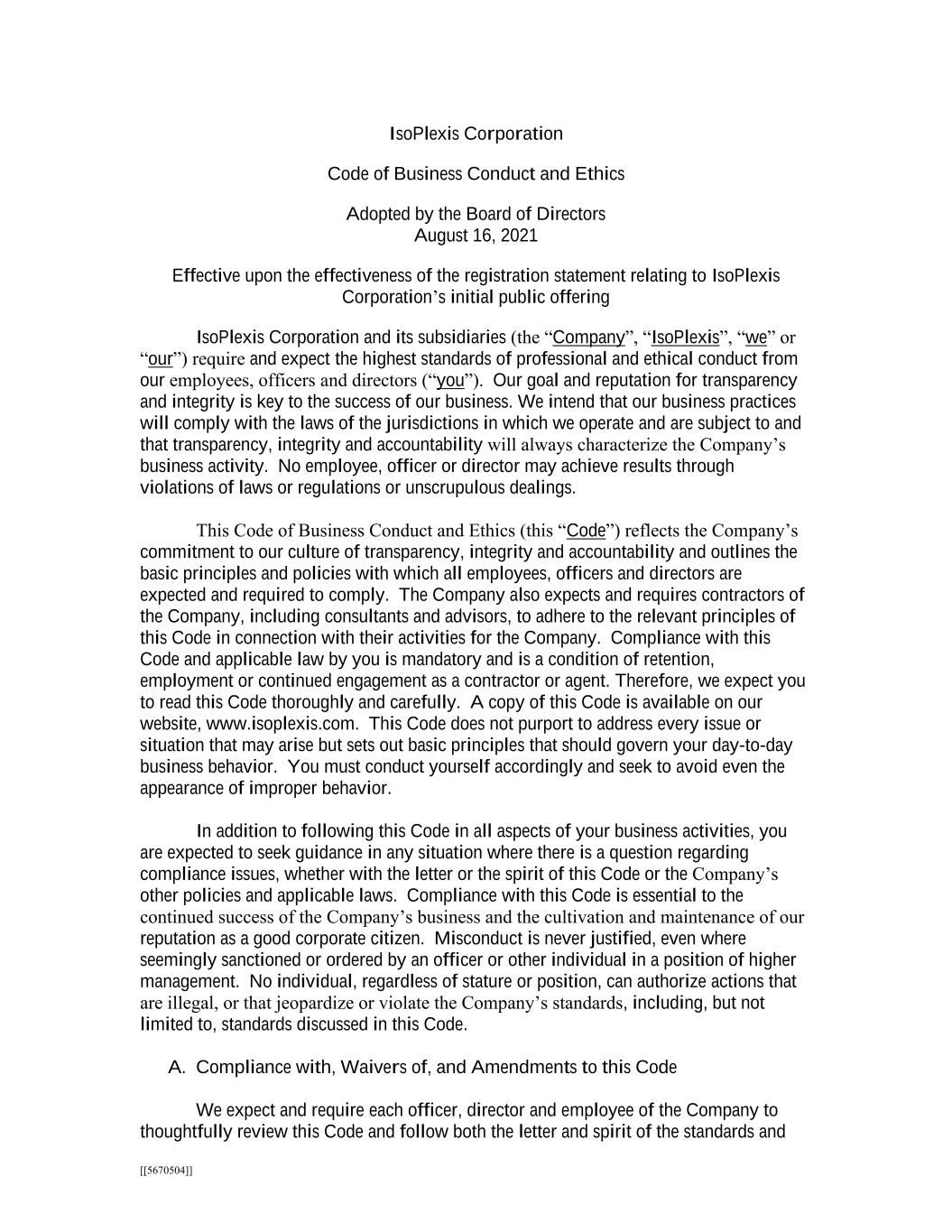
[[5670504]] IsoPlexis Corporation Code of Business Conduct and Ethics Adopted by the Board of Directors August 16, 2021 Effective upon the effectiveness of the registration statement relating to IsoPlexis Corporation’s initial public offering IsoPlexis Corporation and its subsidiaries (the “Company”, “IsoPlexis”, “we” or “our”) require and expect the highest standards of professional and ethical conduct from our employees, officers and directors (“you”). Our goal and reputation for transparency and integrity is key to the success of our business. We intend that our business practices will comply with the laws of the jurisdictions in which we operate and are subject to and that transparency, integrity and accountability will always characterize the Company’s business activity. No employee, officer or director may achieve results through violations of laws or regulations or unscrupulous dealings. This Code of Business Conduct and Ethics (this “Code”) reflects the Company’s commitment to our culture of transparency, integrity and accountability and outlines the basic principles and policies with which all employees, officers and directors are expected and required to comply. The Company also expects and requires contractors of the Company, including consultants and advisors, to adhere to the relevant principles of this Code in connection with their activities for the Company. Compliance with this Code and applicable law by you is mandatory and is a condition of retention, employment or continued engagement as a contractor or agent. Therefore, we expect you to read this Code thoroughly and carefully. A copy of this Code is available on our website, www.isoplexis.com. This Code does not purport to address every issue or situation that may arise but sets out basic principles that should govern your day-to-day business behavior. You must conduct yourself accordingly and seek to avoid even the appearance of improper behavior. In addition to following this Code in all aspects of your business activities, you are expected to seek guidance in any situation where there is a question regarding compliance issues, whether with the letter or the spirit of this Code or the Company’s other policies and applicable laws. Compliance with this Code is essential to the continued success of the Company’s business and the cultivation and maintenance of our reputation as a good corporate citizen. Misconduct is never justified, even where seemingly sanctioned or ordered by an officer or other individual in a position of higher management. No individual, regardless of stature or position, can authorize actions that are illegal, or that jeopardize or violate the Company’s standards, including, but not limited to, standards discussed in this Code. A. Compliance with, Waivers of, and Amendments to this Code We expect and require each officer, director and employee of the Company to thoughtfully review this Code and follow both the letter and spirit of the standards and
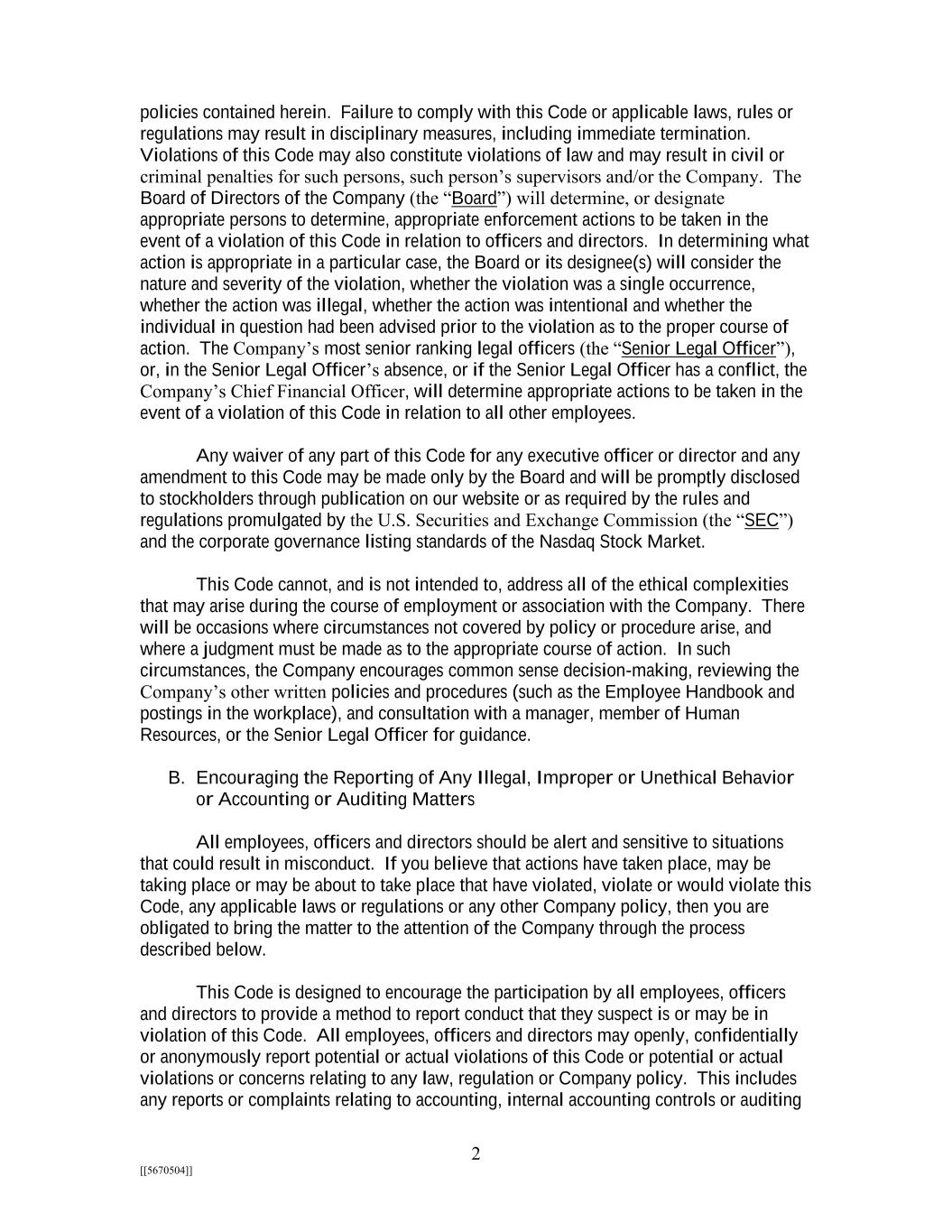
2 [[5670504]] policies contained herein. Failure to comply with this Code or applicable laws, rules or regulations may result in disciplinary measures, including immediate termination. Violations of this Code may also constitute violations of law and may result in civil or criminal penalties for such persons, such person’s supervisors and/or the Company. The Board of Directors of the Company (the “Board”) will determine, or designate appropriate persons to determine, appropriate enforcement actions to be taken in the event of a violation of this Code in relation to officers and directors. In determining what action is appropriate in a particular case, the Board or its designee(s) will consider the nature and severity of the violation, whether the violation was a single occurrence, whether the action was illegal, whether the action was intentional and whether the individual in question had been advised prior to the violation as to the proper course of action. The Company’s most senior ranking legal officers (the “Senior Legal Officer”), or, in the Senior Legal Officer’s absence, or if the Senior Legal Officer has a conflict, the Company’s Chief Financial Officer, will determine appropriate actions to be taken in the event of a violation of this Code in relation to all other employees. Any waiver of any part of this Code for any executive officer or director and any amendment to this Code may be made only by the Board and will be promptly disclosed to stockholders through publication on our website or as required by the rules and regulations promulgated by the U.S. Securities and Exchange Commission (the “SEC”) and the corporate governance listing standards of the Nasdaq Stock Market. This Code cannot, and is not intended to, address all of the ethical complexities that may arise during the course of employment or association with the Company. There will be occasions where circumstances not covered by policy or procedure arise, and where a judgment must be made as to the appropriate course of action. In such circumstances, the Company encourages common sense decision-making, reviewing the Company’s other written policies and procedures (such as the Employee Handbook and postings in the workplace), and consultation with a manager, member of Human Resources, or the Senior Legal Officer for guidance. B. Encouraging the Reporting of Any Illegal, Improper or Unethical Behavior or Accounting or Auditing Matters All employees, officers and directors should be alert and sensitive to situations that could result in misconduct. If you believe that actions have taken place, may be taking place or may be about to take place that have violated, violate or would violate this Code, any applicable laws or regulations or any other Company policy, then you are obligated to bring the matter to the attention of the Company through the process described below. This Code is designed to encourage the participation by all employees, officers and directors to provide a method to report conduct that they suspect is or may be in violation of this Code. All employees, officers and directors may openly, confidentially or anonymously report potential or actual violations of this Code or potential or actual violations or concerns relating to any law, regulation or Company policy. This includes any reports or complaints relating to accounting, internal accounting controls or auditing
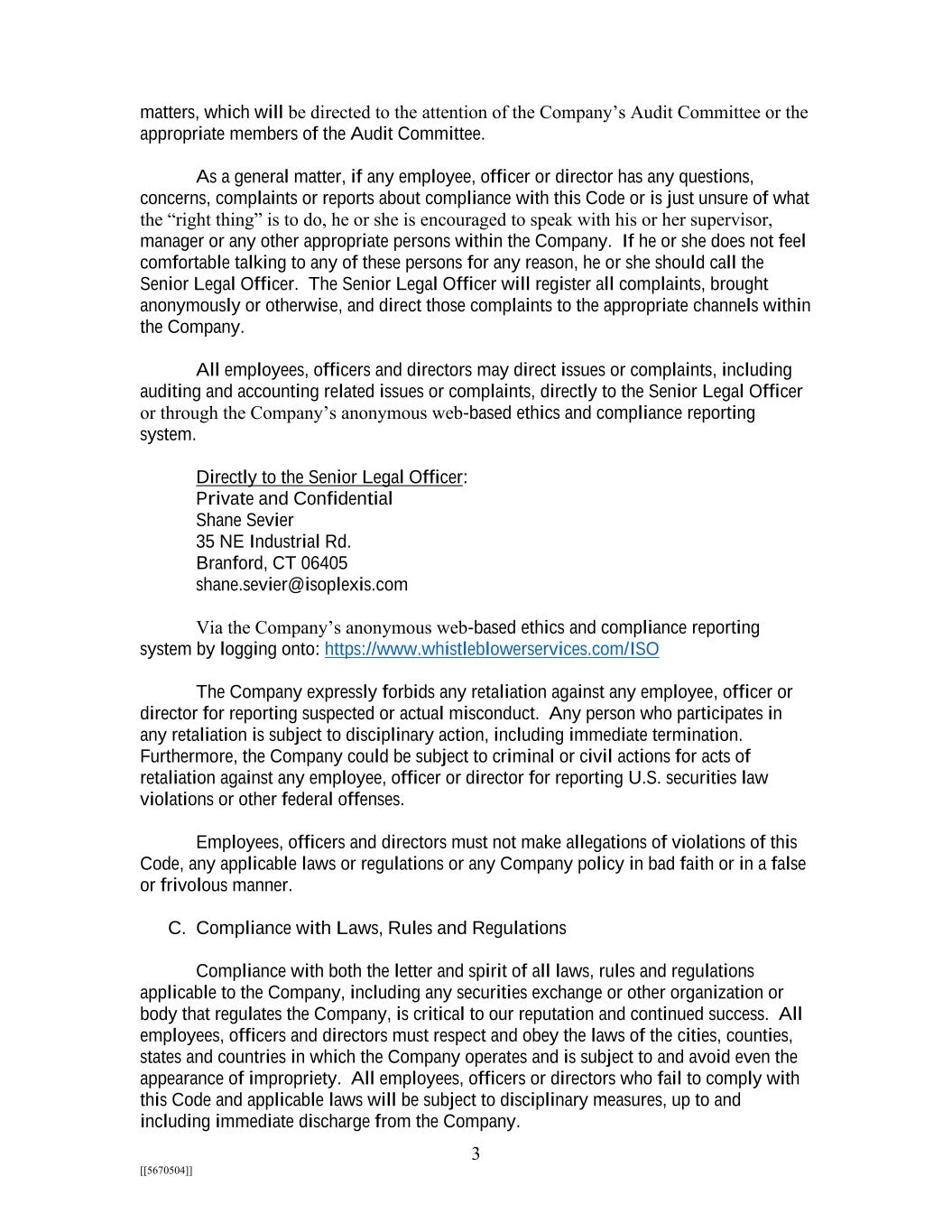
3 [[5670504]] matters, which will be directed to the attention of the Company’s Audit Committee or the appropriate members of the Audit Committee. As a general matter, if any employee, officer or director has any questions, concerns, complaints or reports about compliance with this Code or is just unsure of what the “right thing” is to do, he or she is encouraged to speak with his or her supervisor, manager or any other appropriate persons within the Company. If he or she does not feel comfortable talking to any of these persons for any reason, he or she should call the Senior Legal Officer. The Senior Legal Officer will register all complaints, brought anonymously or otherwise, and direct those complaints to the appropriate channels within the Company. All employees, officers and directors may direct issues or complaints, including auditing and accounting related issues or complaints, directly to the Senior Legal Officer or through the Company’s anonymous web-based ethics and compliance reporting system. Directly to the Senior Legal Officer: Private and Confidential Shane Sevier 35 NE Industrial Rd. Branford, CT 06405 shane.sevier@isoplexis.com Via the Company’s anonymous web-based ethics and compliance reporting system by logging onto: https://www.whistleblowerservices.com/ISO The Company expressly forbids any retaliation against any employee, officer or director for reporting suspected or actual misconduct. Any person who participates in any retaliation is subject to disciplinary action, including immediate termination. Furthermore, the Company could be subject to criminal or civil actions for acts of retaliation against any employee, officer or director for reporting U.S. securities law violations or other federal offenses. Employees, officers and directors must not make allegations of violations of this Code, any applicable laws or regulations or any Company policy in bad faith or in a false or frivolous manner. C. Compliance with Laws, Rules and Regulations Compliance with both the letter and spirit of all laws, rules and regulations applicable to the Company, including any securities exchange or other organization or body that regulates the Company, is critical to our reputation and continued success. All employees, officers and directors must respect and obey the laws of the cities, counties, states and countries in which the Company operates and is subject to and avoid even the appearance of impropriety. All employees, officers or directors who fail to comply with this Code and applicable laws will be subject to disciplinary measures, up to and including immediate discharge from the Company.
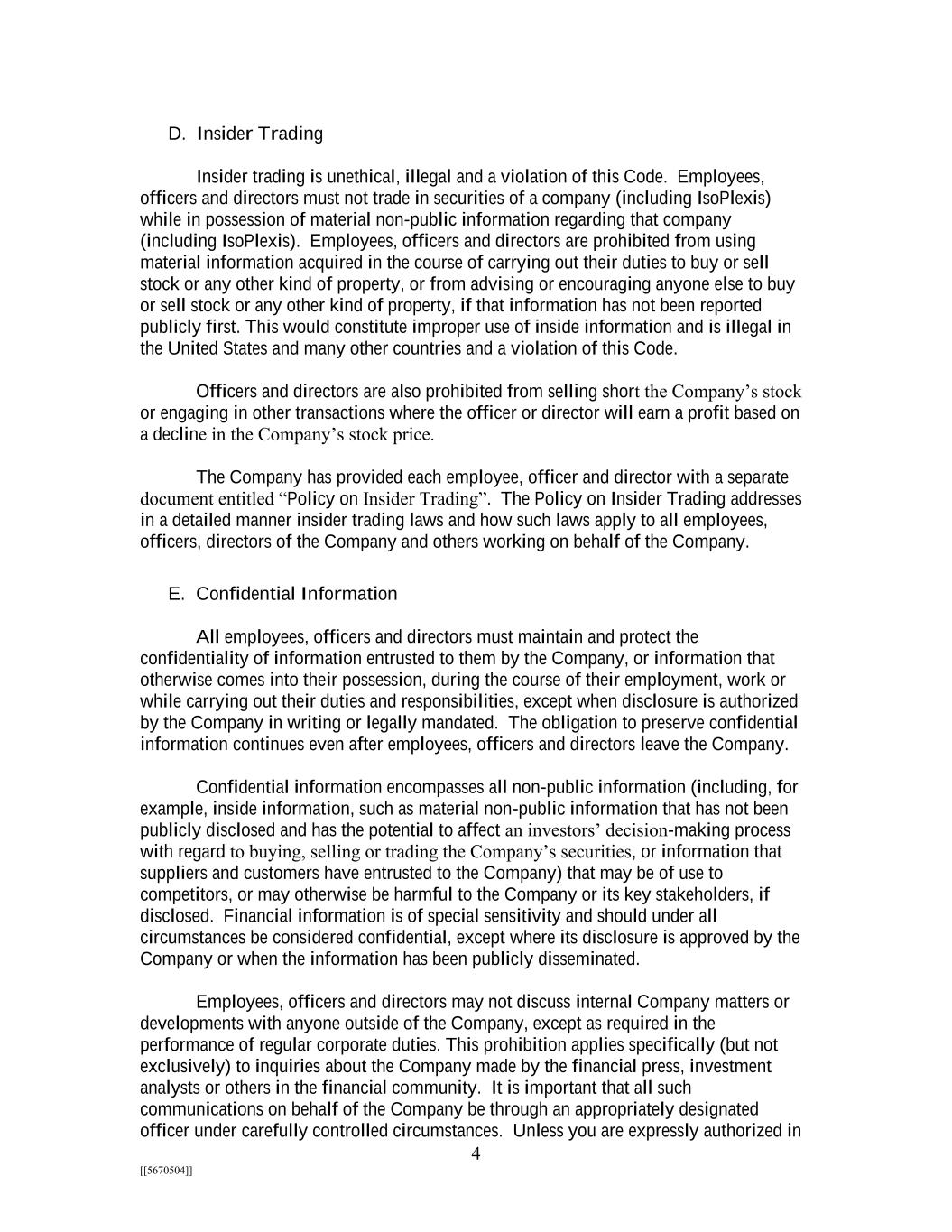
4 [[5670504]] D. Insider Trading Insider trading is unethical, illegal and a violation of this Code. Employees, officers and directors must not trade in securities of a company (including IsoPlexis) while in possession of material non-public information regarding that company (including IsoPlexis). Employees, officers and directors are prohibited from using material information acquired in the course of carrying out their duties to buy or sell stock or any other kind of property, or from advising or encouraging anyone else to buy or sell stock or any other kind of property, if that information has not been reported publicly first. This would constitute improper use of inside information and is illegal in the United States and many other countries and a violation of this Code. Officers and directors are also prohibited from selling short the Company’s stock or engaging in other transactions where the officer or director will earn a profit based on a decline in the Company’s stock price. The Company has provided each employee, officer and director with a separate document entitled “Policy on Insider Trading”. The Policy on Insider Trading addresses in a detailed manner insider trading laws and how such laws apply to all employees, officers, directors of the Company and others working on behalf of the Company. E. Confidential Information All employees, officers and directors must maintain and protect the confidentiality of information entrusted to them by the Company, or information that otherwise comes into their possession, during the course of their employment, work or while carrying out their duties and responsibilities, except when disclosure is authorized by the Company in writing or legally mandated. The obligation to preserve confidential information continues even after employees, officers and directors leave the Company. Confidential information encompasses all non-public information (including, for example, inside information, such as material non-public information that has not been publicly disclosed and has the potential to affect an investors’ decision-making process with regard to buying, selling or trading the Company’s securities, or information that suppliers and customers have entrusted to the Company) that may be of use to competitors, or may otherwise be harmful to the Company or its key stakeholders, if disclosed. Financial information is of special sensitivity and should under all circumstances be considered confidential, except where its disclosure is approved by the Company or when the information has been publicly disseminated. Employees, officers and directors may not discuss internal Company matters or developments with anyone outside of the Company, except as required in the performance of regular corporate duties. This prohibition applies specifically (but not exclusively) to inquiries about the Company made by the financial press, investment analysts or others in the financial community. It is important that all such communications on behalf of the Company be through an appropriately designated officer under carefully controlled circumstances. Unless you are expressly authorized in
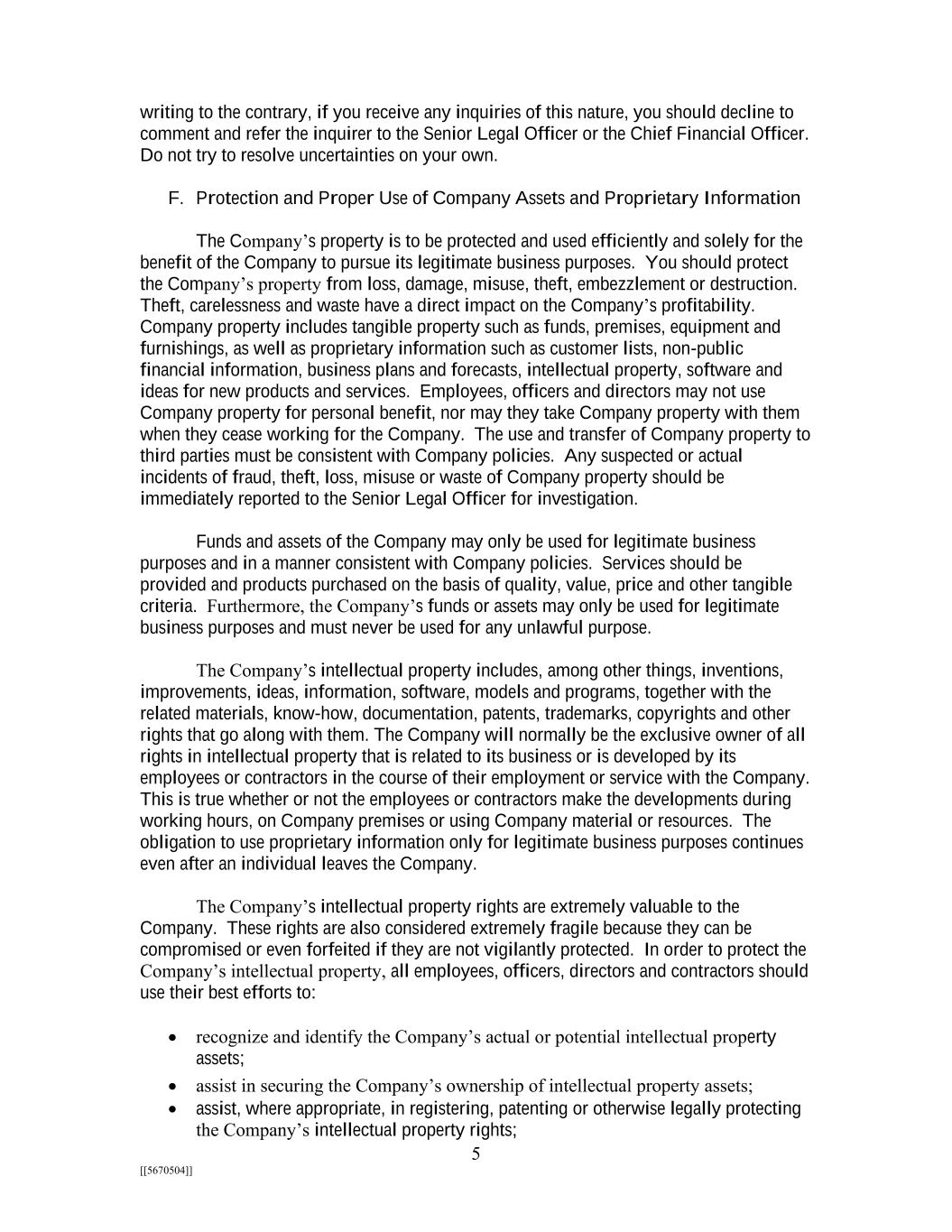
5 [[5670504]] writing to the contrary, if you receive any inquiries of this nature, you should decline to comment and refer the inquirer to the Senior Legal Officer or the Chief Financial Officer. Do not try to resolve uncertainties on your own. F. Protection and Proper Use of Company Assets and Proprietary Information The Company’s property is to be protected and used efficiently and solely for the benefit of the Company to pursue its legitimate business purposes. You should protect the Company’s property from loss, damage, misuse, theft, embezzlement or destruction. Theft, carelessness and waste have a direct impact on the Company’s profitability. Company property includes tangible property such as funds, premises, equipment and furnishings, as well as proprietary information such as customer lists, non-public financial information, business plans and forecasts, intellectual property, software and ideas for new products and services. Employees, officers and directors may not use Company property for personal benefit, nor may they take Company property with them when they cease working for the Company. The use and transfer of Company property to third parties must be consistent with Company policies. Any suspected or actual incidents of fraud, theft, loss, misuse or waste of Company property should be immediately reported to the Senior Legal Officer for investigation. Funds and assets of the Company may only be used for legitimate business purposes and in a manner consistent with Company policies. Services should be provided and products purchased on the basis of quality, value, price and other tangible criteria. Furthermore, the Company’s funds or assets may only be used for legitimate business purposes and must never be used for any unlawful purpose. The Company’s intellectual property includes, among other things, inventions, improvements, ideas, information, software, models and programs, together with the related materials, know-how, documentation, patents, trademarks, copyrights and other rights that go along with them. The Company will normally be the exclusive owner of all rights in intellectual property that is related to its business or is developed by its employees or contractors in the course of their employment or service with the Company. This is true whether or not the employees or contractors make the developments during working hours, on Company premises or using Company material or resources. The obligation to use proprietary information only for legitimate business purposes continues even after an individual leaves the Company. The Company’s intellectual property rights are extremely valuable to the Company. These rights are also considered extremely fragile because they can be compromised or even forfeited if they are not vigilantly protected. In order to protect the Company’s intellectual property, all employees, officers, directors and contractors should use their best efforts to: • recognize and identify the Company’s actual or potential intellectual property assets; • assist in securing the Company’s ownership of intellectual property assets; • assist, where appropriate, in registering, patenting or otherwise legally protecting the Company’s intellectual property rights;
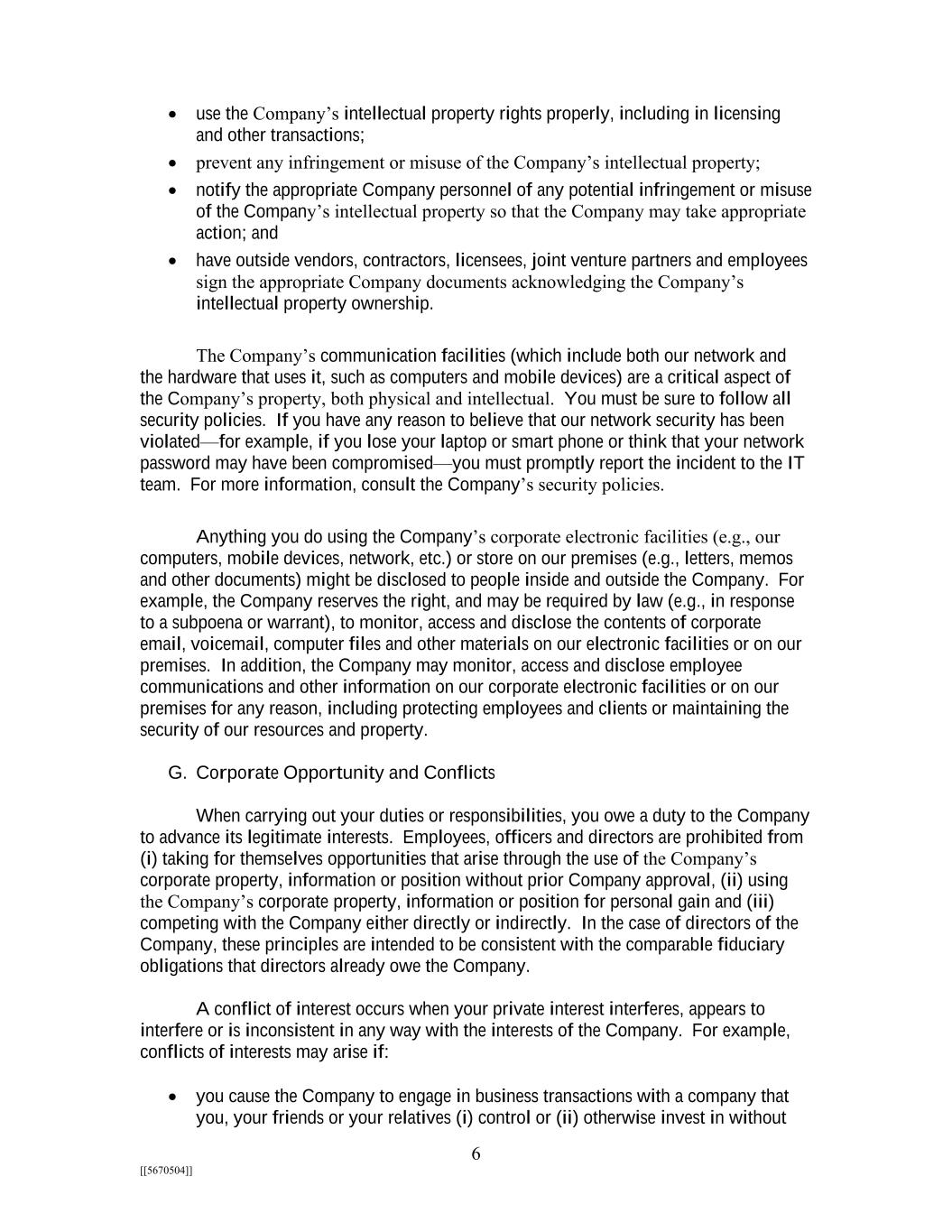
6 [[5670504]] • use the Company’s intellectual property rights properly, including in licensing and other transactions; • prevent any infringement or misuse of the Company’s intellectual property; • notify the appropriate Company personnel of any potential infringement or misuse of the Company’s intellectual property so that the Company may take appropriate action; and • have outside vendors, contractors, licensees, joint venture partners and employees sign the appropriate Company documents acknowledging the Company’s intellectual property ownership. The Company’s communication facilities (which include both our network and the hardware that uses it, such as computers and mobile devices) are a critical aspect of the Company’s property, both physical and intellectual. You must be sure to follow all security policies. If you have any reason to believe that our network security has been violated—for example, if you lose your laptop or smart phone or think that your network password may have been compromised—you must promptly report the incident to the IT team. For more information, consult the Company’s security policies. Anything you do using the Company’s corporate electronic facilities (e.g., our computers, mobile devices, network, etc.) or store on our premises (e.g., letters, memos and other documents) might be disclosed to people inside and outside the Company. For example, the Company reserves the right, and may be required by law (e.g., in response to a subpoena or warrant), to monitor, access and disclose the contents of corporate email, voicemail, computer files and other materials on our electronic facilities or on our premises. In addition, the Company may monitor, access and disclose employee communications and other information on our corporate electronic facilities or on our premises for any reason, including protecting employees and clients or maintaining the security of our resources and property. G. Corporate Opportunity and Conflicts When carrying out your duties or responsibilities, you owe a duty to the Company to advance its legitimate interests. Employees, officers and directors are prohibited from (i) taking for themselves opportunities that arise through the use of the Company’s corporate property, information or position without prior Company approval, (ii) using the Company’s corporate property, information or position for personal gain and (iii) competing with the Company either directly or indirectly. In the case of directors of the Company, these principles are intended to be consistent with the comparable fiduciary obligations that directors already owe the Company. A conflict of interest occurs when your private interest interferes, appears to interfere or is inconsistent in any way with the interests of the Company. For example, conflicts of interests may arise if: • you cause the Company to engage in business transactions with a company that you, your friends or your relatives (i) control or (ii) otherwise invest in without

7 [[5670504]] having obtained the appropriate prior approvals required. See also “Related Person Transactions” below; • you are in a position to (i) compete with, rather than help, the Company or (ii) make a business decision not on the basis of the Company’s interest but rather for your own personal advantage; • you take actions, or have personal or family interests, that may make it difficult to perform your work (or discharge your duties and obligations) effectively; or • you, or any of your family members or affiliates, receive improper personal benefits as a result of your position in the Company other than gratuities and payments received or provided in compliance with the guidelines set forth in “Business Gifts and Entertainment” below. A conflict of interest may not be immediately recognizable, and therefore potential conflicts must be reported immediately to the Senior Legal Officer. Further, if you become aware of a conflict or potential conflict of interest involving another employee, officer or director, you should bring it to the attention of the Senior Legal Officer or a member of the Audit Committee. If the concern requires confidentiality, including keeping particular individuals anonymous, then this confidentiality will be protected, except to the extent necessary to conduct an effective investigation or as required by applicable law, regulation or legal proceedings. H. Business Gifts and Entertainment The Company recognizes that occasional exchanges of business courtesies between vendors, suppliers and our employees, such as entertainment, meals or gifts, can be helpful in building and maintaining business relationships. However, you should exercise extreme caution when accepting offers of entertainment, meals or gifts, as regular or excessive entertainment, meals or gifts can easily create a conflict of interest or an appearance of a conflict of interest, and irreparably damage your reputation and the reputation of the Company. Generally, entertainment and gifts must have a clear business purpose and should benefit the Company by building trust and goodwill in the business relationship. Participating in entertainment such as meals, sports events, golf outings, and celebration functions with our business partners is acceptable provided the entertainment with the same business partner is infrequent, in good taste, in moderation and not extravagant. Similarly, gifts should only be of nominal value, infrequent, in good taste, in moderation and not extravagant. Efforts should also be made so that even when a clear business purpose has been established, the costs for the entertainment or meals are shared, or reciprocated when appropriate and possible. In no event should you ever solicit offers of entertainment, meals or gifts, and, similarly, you must never accept entertainment, meals or gifts if there is no clear business purpose, if such acceptance would create a conflict of interest or appear to create a conflict of interest, or if it can be construed as a bribe or payoff or violate any laws or regulations. Strict rules apply when the Company does business with governmental agencies and officials, whether in the United States or in other countries. See also “Illegal
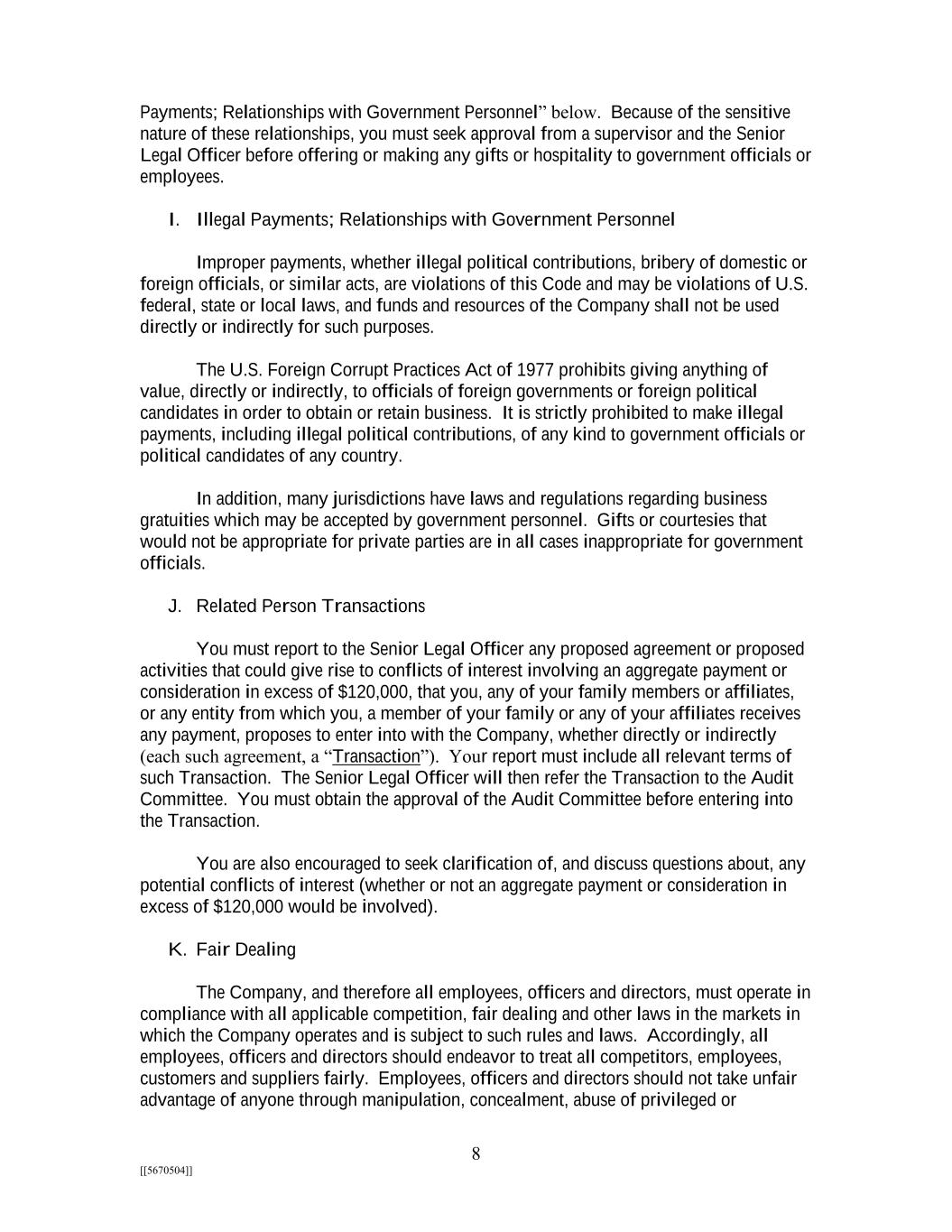
8 [[5670504]] Payments; Relationships with Government Personnel” below. Because of the sensitive nature of these relationships, you must seek approval from a supervisor and the Senior Legal Officer before offering or making any gifts or hospitality to government officials or employees. I. Illegal Payments; Relationships with Government Personnel Improper payments, whether illegal political contributions, bribery of domestic or foreign officials, or similar acts, are violations of this Code and may be violations of U.S. federal, state or local laws, and funds and resources of the Company shall not be used directly or indirectly for such purposes. The U.S. Foreign Corrupt Practices Act of 1977 prohibits giving anything of value, directly or indirectly, to officials of foreign governments or foreign political candidates in order to obtain or retain business. It is strictly prohibited to make illegal payments, including illegal political contributions, of any kind to government officials or political candidates of any country. In addition, many jurisdictions have laws and regulations regarding business gratuities which may be accepted by government personnel. Gifts or courtesies that would not be appropriate for private parties are in all cases inappropriate for government officials. J. Related Person Transactions You must report to the Senior Legal Officer any proposed agreement or proposed activities that could give rise to conflicts of interest involving an aggregate payment or consideration in excess of $120,000, that you, any of your family members or affiliates, or any entity from which you, a member of your family or any of your affiliates receives any payment, proposes to enter into with the Company, whether directly or indirectly (each such agreement, a “Transaction”). Your report must include all relevant terms of such Transaction. The Senior Legal Officer will then refer the Transaction to the Audit Committee. You must obtain the approval of the Audit Committee before entering into the Transaction. You are also encouraged to seek clarification of, and discuss questions about, any potential conflicts of interest (whether or not an aggregate payment or consideration in excess of $120,000 would be involved). K. Fair Dealing The Company, and therefore all employees, officers and directors, must operate in compliance with all applicable competition, fair dealing and other laws in the markets in which the Company operates and is subject to such rules and laws. Accordingly, all employees, officers and directors should endeavor to treat all competitors, employees, customers and suppliers fairly. Employees, officers and directors should not take unfair advantage of anyone through manipulation, concealment, abuse of privileged or
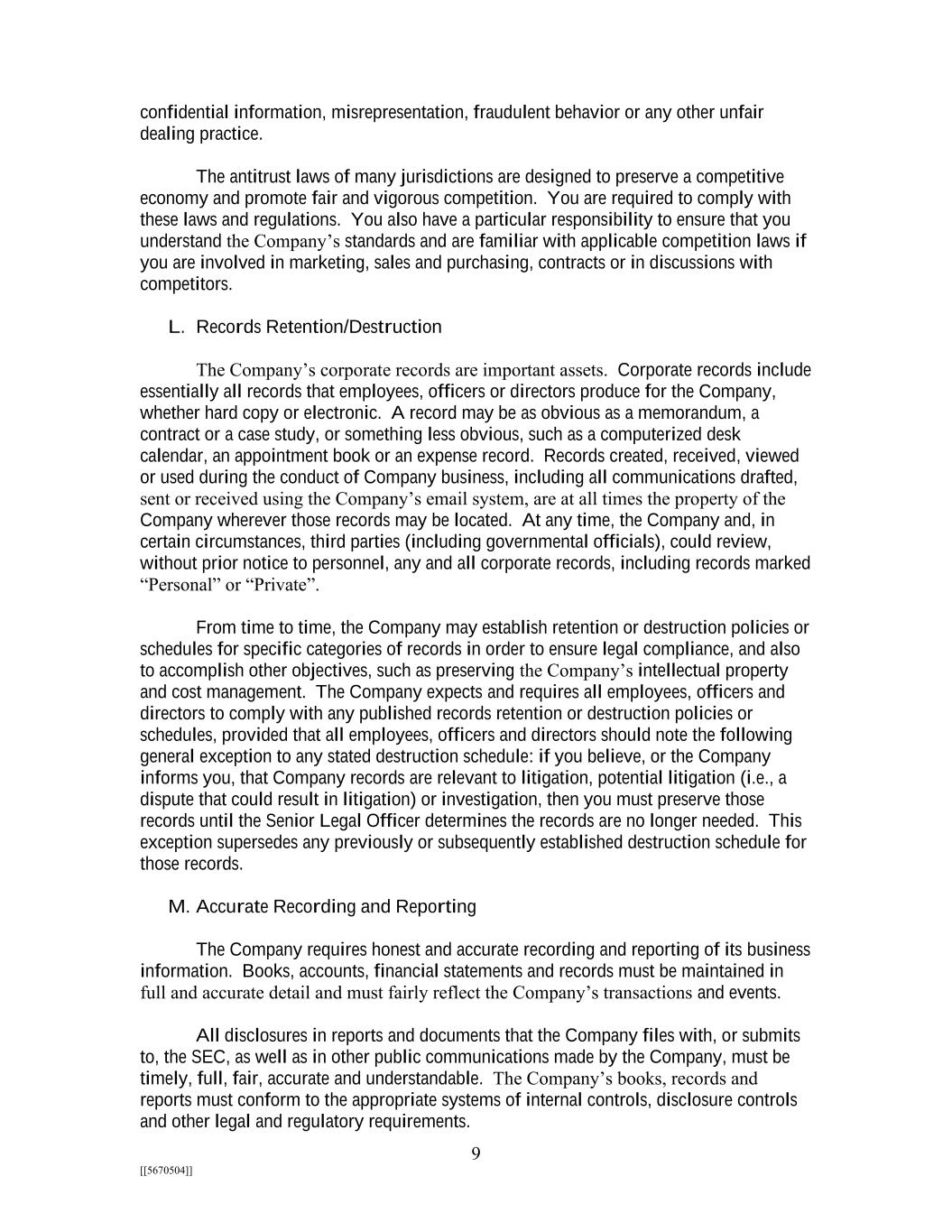
9 [[5670504]] confidential information, misrepresentation, fraudulent behavior or any other unfair dealing practice. The antitrust laws of many jurisdictions are designed to preserve a competitive economy and promote fair and vigorous competition. You are required to comply with these laws and regulations. You also have a particular responsibility to ensure that you understand the Company’s standards and are familiar with applicable competition laws if you are involved in marketing, sales and purchasing, contracts or in discussions with competitors. L. Records Retention/Destruction The Company’s corporate records are important assets. Corporate records include essentially all records that employees, officers or directors produce for the Company, whether hard copy or electronic. A record may be as obvious as a memorandum, a contract or a case study, or something less obvious, such as a computerized desk calendar, an appointment book or an expense record. Records created, received, viewed or used during the conduct of Company business, including all communications drafted, sent or received using the Company’s email system, are at all times the property of the Company wherever those records may be located. At any time, the Company and, in certain circumstances, third parties (including governmental officials), could review, without prior notice to personnel, any and all corporate records, including records marked “Personal” or “Private”. From time to time, the Company may establish retention or destruction policies or schedules for specific categories of records in order to ensure legal compliance, and also to accomplish other objectives, such as preserving the Company’s intellectual property and cost management. The Company expects and requires all employees, officers and directors to comply with any published records retention or destruction policies or schedules, provided that all employees, officers and directors should note the following general exception to any stated destruction schedule: if you believe, or the Company informs you, that Company records are relevant to litigation, potential litigation (i.e., a dispute that could result in litigation) or investigation, then you must preserve those records until the Senior Legal Officer determines the records are no longer needed. This exception supersedes any previously or subsequently established destruction schedule for those records. M. Accurate Recording and Reporting The Company requires honest and accurate recording and reporting of its business information. Books, accounts, financial statements and records must be maintained in full and accurate detail and must fairly reflect the Company’s transactions and events. All disclosures in reports and documents that the Company files with, or submits to, the SEC, as well as in other public communications made by the Company, must be timely, full, fair, accurate and understandable. The Company’s books, records and reports must conform to the appropriate systems of internal controls, disclosure controls and other legal and regulatory requirements.
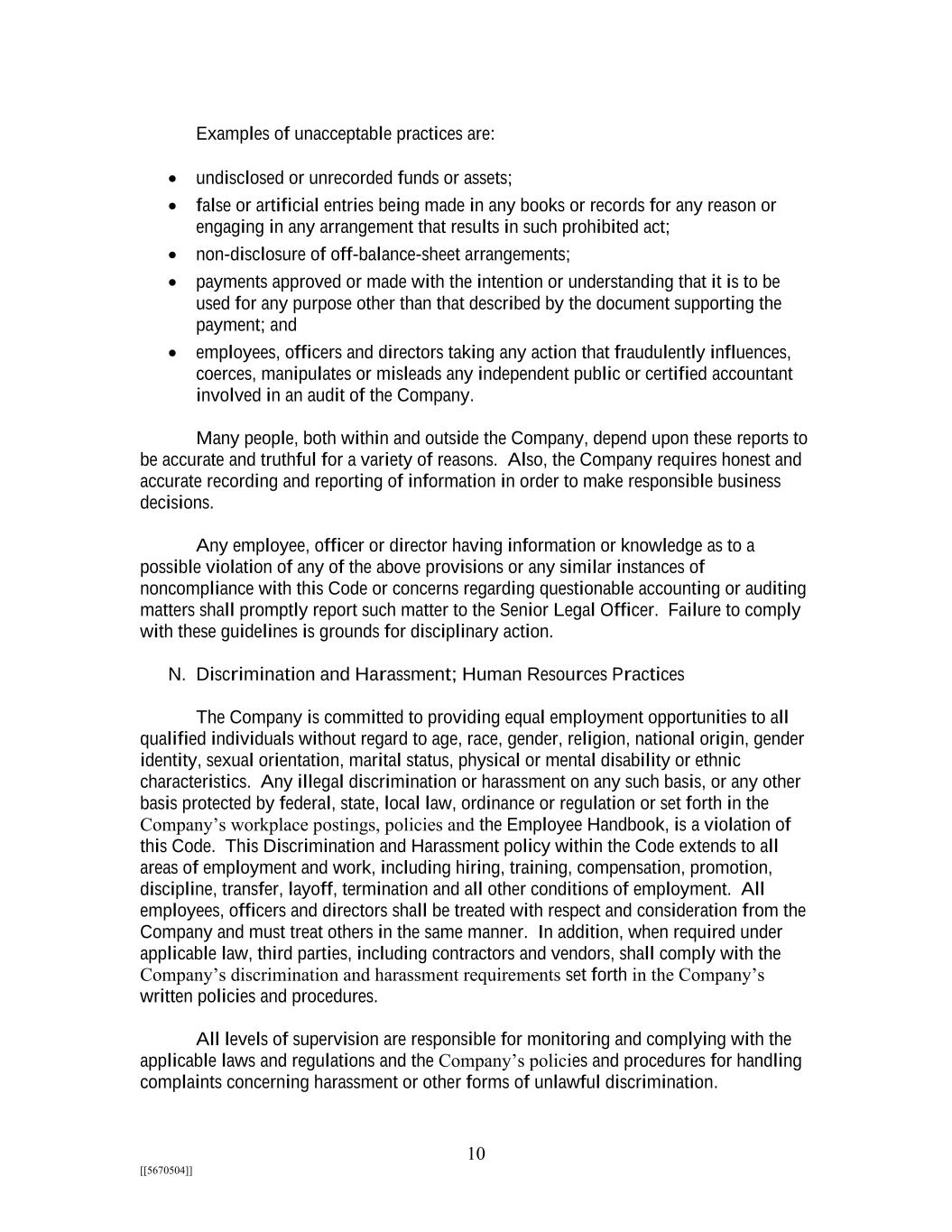
10 [[5670504]] Examples of unacceptable practices are: • undisclosed or unrecorded funds or assets; • false or artificial entries being made in any books or records for any reason or engaging in any arrangement that results in such prohibited act; • non-disclosure of off-balance-sheet arrangements; • payments approved or made with the intention or understanding that it is to be used for any purpose other than that described by the document supporting the payment; and • employees, officers and directors taking any action that fraudulently influences, coerces, manipulates or misleads any independent public or certified accountant involved in an audit of the Company. Many people, both within and outside the Company, depend upon these reports to be accurate and truthful for a variety of reasons. Also, the Company requires honest and accurate recording and reporting of information in order to make responsible business decisions. Any employee, officer or director having information or knowledge as to a possible violation of any of the above provisions or any similar instances of noncompliance with this Code or concerns regarding questionable accounting or auditing matters shall promptly report such matter to the Senior Legal Officer. Failure to comply with these guidelines is grounds for disciplinary action. N. Discrimination and Harassment; Human Resources Practices The Company is committed to providing equal employment opportunities to all qualified individuals without regard to age, race, gender, religion, national origin, gender identity, sexual orientation, marital status, physical or mental disability or ethnic characteristics. Any illegal discrimination or harassment on any such basis, or any other basis protected by federal, state, local law, ordinance or regulation or set forth in the Company’s workplace postings, policies and the Employee Handbook, is a violation of this Code. This Discrimination and Harassment policy within the Code extends to all areas of employment and work, including hiring, training, compensation, promotion, discipline, transfer, layoff, termination and all other conditions of employment. All employees, officers and directors shall be treated with respect and consideration from the Company and must treat others in the same manner. In addition, when required under applicable law, third parties, including contractors and vendors, shall comply with the Company’s discrimination and harassment requirements set forth in the Company’s written policies and procedures. All levels of supervision are responsible for monitoring and complying with the applicable laws and regulations and the Company’s policies and procedures for handling complaints concerning harassment or other forms of unlawful discrimination.
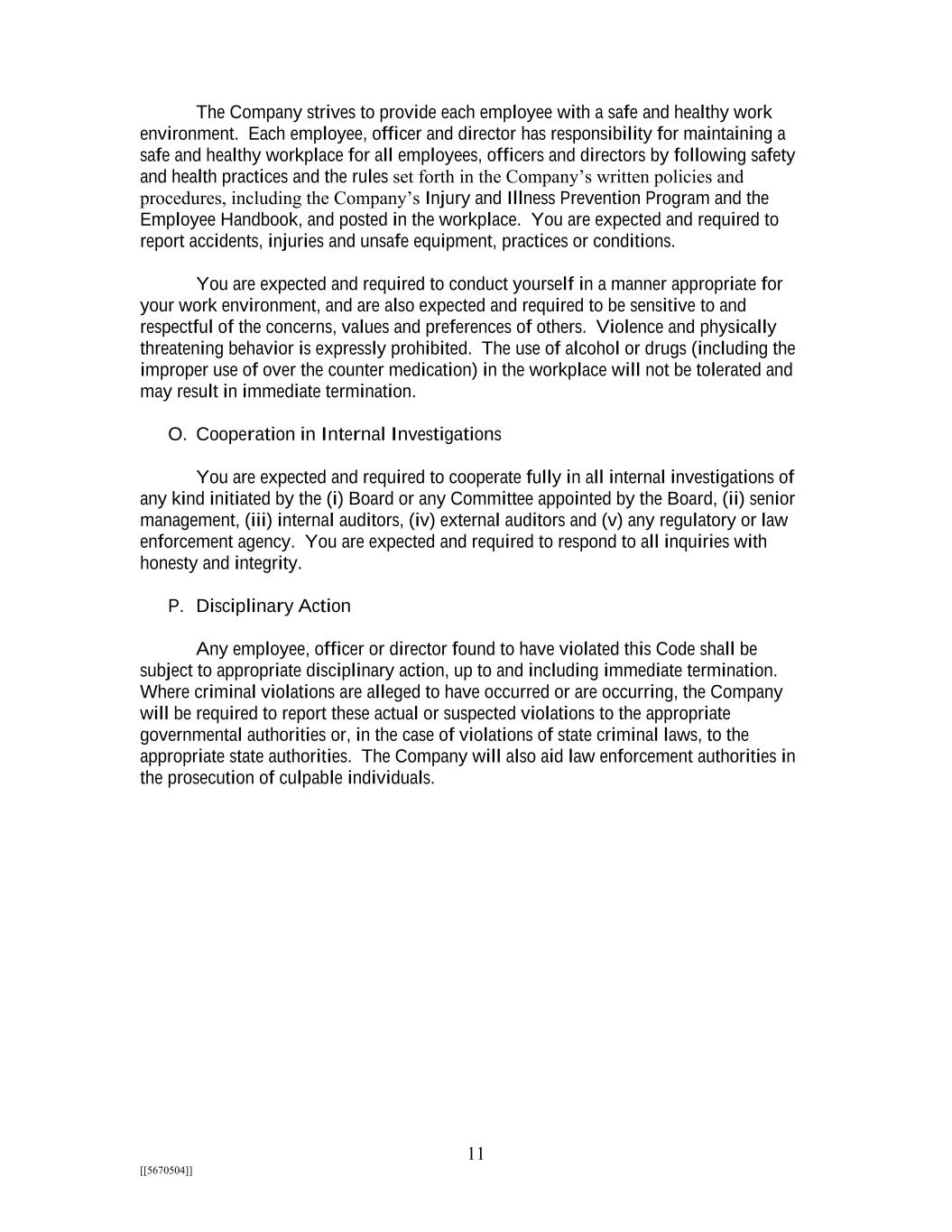
11 [[5670504]] The Company strives to provide each employee with a safe and healthy work environment. Each employee, officer and director has responsibility for maintaining a safe and healthy workplace for all employees, officers and directors by following safety and health practices and the rules set forth in the Company’s written policies and procedures, including the Company’s Injury and Illness Prevention Program and the Employee Handbook, and posted in the workplace. You are expected and required to report accidents, injuries and unsafe equipment, practices or conditions. You are expected and required to conduct yourself in a manner appropriate for your work environment, and are also expected and required to be sensitive to and respectful of the concerns, values and preferences of others. Violence and physically threatening behavior is expressly prohibited. The use of alcohol or drugs (including the improper use of over the counter medication) in the workplace will not be tolerated and may result in immediate termination. O. Cooperation in Internal Investigations You are expected and required to cooperate fully in all internal investigations of any kind initiated by the (i) Board or any Committee appointed by the Board, (ii) senior management, (iii) internal auditors, (iv) external auditors and (v) any regulatory or law enforcement agency. You are expected and required to respond to all inquiries with honesty and integrity. P. Disciplinary Action Any employee, officer or director found to have violated this Code shall be subject to appropriate disciplinary action, up to and including immediate termination. Where criminal violations are alleged to have occurred or are occurring, the Company will be required to report these actual or suspected violations to the appropriate governmental authorities or, in the case of violations of state criminal laws, to the appropriate state authorities. The Company will also aid law enforcement authorities in the prosecution of culpable individuals.










